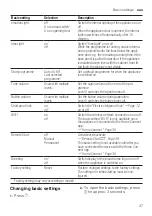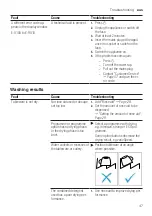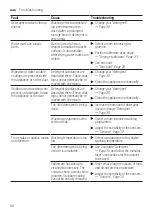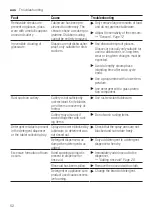
Troubleshooting
aus
51
Fault
Cause
Troubleshooting
Coloured coatings (blue, yel-
low, brown) that are difficult
or impossible to remove are
present inside the appliance
or on stainless steel table-
ware.
The formation of films is due
to substances contained in
vegetables (cabbage, celery,
potatoes, noodles, etc.) or
tap water (manganese).
▶
Clean the appliance.
You can remove deposits with
"Mechanical cleaning"
or a machine cleaning product. It
may not always be possible to com-
pletely remove deposits but they
are harmless to health.
The formation of films is due
to metal components on sil-
ver or aluminium tableware.
▶
Clean the appliance.
You can remove deposits with
"Mechanical cleaning"
or a machine cleaning product. It
may not always be possible to com-
pletely remove deposits but they
are harmless to health.
Plastic parts inside the appli-
ance are discoloured.
Plastic parts inside the appli-
ance may become discol-
oured during the life of the
dishwasher.
▶
Discolouration can come about and
will not impair functioning of the ap-
pliance.
Plastic parts are discol-
oured.
Washing temperature is too
low.
▶
Select a programme with a higher
washing temperature.
Tableware has been pre-
cleaned too intensely. The
sensors chose a weaker pro-
gramme. Stubborn soiling
cannot be entirely removed.
▶
Only remove large remnants of food
and do not prerinse tableware.
▶
Adjust the sensitivity of the sensors.
Removable streaks are
present on glasses, glass-
ware with a metallic appear-
ance and cutlery.
Amount of rinse aid to be
dispensed is set too high.
▶
Set the rinse aid system to a lower
setting.
No rinse aid has been ad-
ded.
▶
Detergent residue is present
in the final rinse. Lid of the
detergent dispenser is
blocked by tableware items
and will not open fully.
1.
Arrange tableware in the top basket
tableware so the tab collecting tray
is not obstructed by tableware.
Items of tableware are blocking the
dispenser lid.
2.
Do not place tableware or fra-
grance dispensers in the tablet col-
lecting tray.










































